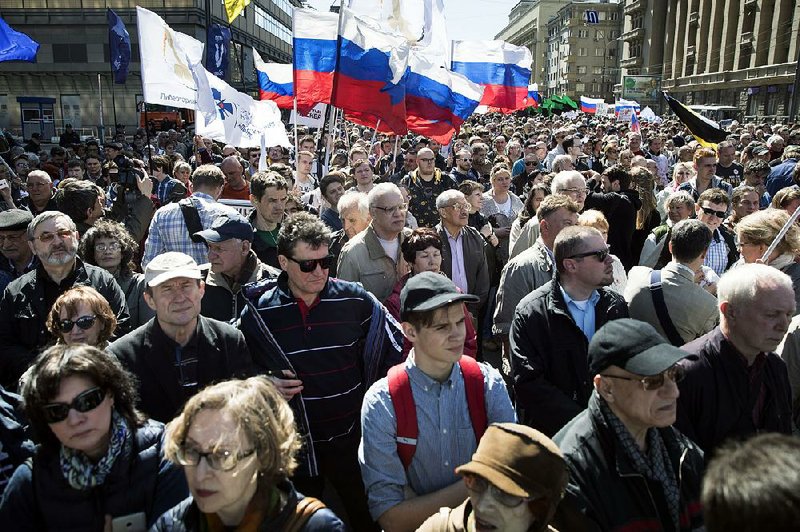MOSCOW -- Pro-Western liberals, hard-line nationalists, gay-rights activists and other Kremlin opponents gathered in central Moscow on Saturday, seeking to revive a broad-based protest movement against President Vladimir Putin that was snuffed out five years ago by mass arrests and stiff jail sentences.
The demonstrators chanted the one demand that unites their disparate causes: "Russia Without Putin!"
The Ministry of Interior said "around 1,000" people took part in the rally Saturday, which was held on a broad avenue named for the Soviet-era dissident Andrei Sakharov.
The true number of protesters appeared to be several times larger, though not as large as the 10,000 people organizers had hoped would come.
The Moscow city police reported no incidents.
Waving Russian flags and the black, yellow and white standard of the Russian empire, the group held a noisy but good-natured rally to mark the fifth anniversary of a violent police crackdown that ended months of protests against Putin in 2011 and 2012.
OVD-Info, an independent group that tracks protest arrests, reported that at least seven people had been detained by the police at a separate gathering in Bolotnaya Square, the site of anti-Kremlin demonstrations in 2011 set off by public fury over falsified election results.
Unlike the nationwide demonstrations organized March 26 by anti-corruption activist Alexei Navalny, the protest Saturday was approved by the authorities beforehand.
Police officers and members of the Russian National Guard, an internal security force set up last year, were out in force, but they did not try to disrupt the gathering.
Navalny, 40 and Russia's most charismatic opposition figure, was absent from Saturday's rally, which was organized by an older generation of Kremlin critics like Lev Ponomarev, a Soviet-era human-rights activist. The crowd was also older than the ones at Navalny's rallies, which drew mostly youthful protesters.
Demoralized and mostly silenced for years by official harassment and a barrage of propaganda on state-controlled media that portrayed them as traitors, opponents of Putin have again found their voice in recent months with a series of street protests.
The March 26 anti-corruption rallies, held in nearly 100 towns across the country, were followed last month by protests in about 30 cities initiated by Open Russia, an organization founded by exiled billionaire Mikhail Khodorkovsky, who was recently banned by Russia's prosecutor general as "undesirable."
The Saturday rally drew diverse and sometimes contradictory groups, including gay-rights activists, extreme nationalists, hard-line socialists, opponents of hunting and critics of a Moscow city government plan to resettle hundreds of thousands of residents so their buildings can be replaced by new developments.
"There are lots of very different people here, but this shows a lot of people are angry about something," said Ildar Feseyev, a 65-year-old member of Yabloko, a liberal party, who joined the protest. Nearby, young men waved the old Russian imperial flag and shouted for the release of Dmitri Demushkin, a nationalist recently sentenced to 2 1/2 years in prison for inciting hatred.
The protests come as the Kremlin gears up for a presidential election next March. Putin has not yet declared whether he will seek re-election, but he is expected to run again.
A Section on 05/07/2017

